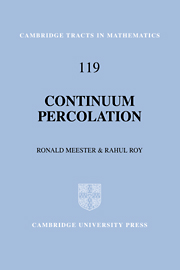Book contents
- Frontmatter
- Contents
- Preface
- 1 Introduction
- 2 Basic methods
- 3 Occupancy in Poisson Boolean models
- 4 Vacancy in Poisson Boolean models
- 5 Distinguishing features of the Poisson Boolean model
- 6 The Poisson random-connection model
- 7 Models driven by general processes
- 8 Other continuum percolation models
- References
- Index
2 - Basic methods
Published online by Cambridge University Press: 05 November 2011
- Frontmatter
- Contents
- Preface
- 1 Introduction
- 2 Basic methods
- 3 Occupancy in Poisson Boolean models
- 4 Vacancy in Poisson Boolean models
- 5 Distinguishing features of the Poisson Boolean model
- 6 The Poisson random-connection model
- 7 Models driven by general processes
- 8 Other continuum percolation models
- References
- Index
Summary
In this chapter we present a few basic results which will be used repeatedly in the subsequent development of the subject. The last few sections of this chapter will be devoted to obtain some inequalities, which are the continuum version of similar theorems in the discrete percolation models. Some proofs here will be obtained by a suitable discretisation and approximation, thus we will be making use of the corresponding results in discrete percolation. The first two sections are devoted to the concepts of ergodicity, coupling and scaling. The techniques of the proofs are hardly needed in the rest of the book, so it is quite possible to read the statements of the main results and move on to the next chapter.
Ergodicity
In this section, we review some results from classical ergodic theory and apply this theory to stationary point processes. The account on ergodic theory will be fairly short; we restrict ourselves to those results which we need in this book. More information about ergodicity and stationary point processes can be found in the book of Daley and Vere-Jones (1988). For a general account on ergodic theory, we refer to the books by Krengel (1985) and Petersen (1983). It will be very convenient here to use a slightly different notation than in the rest of the book in order to clearly see stationary point processes from the viewpoint of measure-preserving transformations (which we introduce in the next paragraph).
Information
- Type
- Chapter
- Information
- Continuum Percolation , pp. 21 - 39Publisher: Cambridge University PressPrint publication year: 1996
